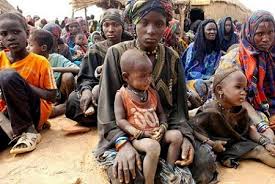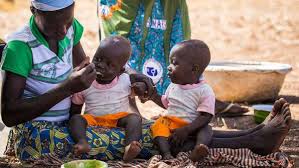There is little hope that Donald Trump’s administration will bring about positive changes for this continent of more than 1.4 billion people, even though African leaders were quick to congratulate him on his election and expressed a desire for collaborations that would benefit both parties.
Following Trump’s victory, William Ruto of Kenya stated that his nation “stands ready” to strengthen its relationship with Washington. A second Trump administration, according to Nigeria’s Bola Tinubu, would usher in a period of “earnest, beneficial, and reciprocal” cooperation.
Nonetheless, analysts predict Trump will not prioritize African nations, which he has previously referred to as “shithole countries.”
Not a concern at all, or low priority?
According to Charles Ray, chair of the Foreign Policy Research Institute’s Africa Program, Africa has not been a top focus for U.S. foreign policy in a long time, except viewing the continent through the prism of opposing adversaries like China and Russia.
Ray, the U.S. ambassador to Zimbabwe from 2009 to 2012, said President Joe Biden mentioned Africa as a crucial ally.
However, those words were not followed by much action.
Any U.S. action on the continent would probably be motivated by Trump’s “transactional, ego-driven leadership style,” Ray continued, adding that Africa “will be at the very bottom of (his) list of priorities.”
Numerous experts concur, pointing to Trump’s “America First” policy.
The Crisis Group’s Africa program director, Murithi Mutiga, said the president-elect is “a committed isolationist and wants to pull back” on several international fronts.
Some claim that even in Africa, bargains can be reached.
According to J. Peter Pham, Trump’s former special envoy to the Sahel and Great Lakes areas of Africa, the next Trump administration might seek a “win-win” scenario in Africa.
Laptops 1000Pham stated during a Voice of America broadcast that this might involve a renewal of the African Growth and Opportunity Act, which allows duty-free access to U.S. markets for qualified African nations.
However, according to Pham, U.S. politicians have been questioning whether African nations are adhering to the program’s requirements or if they are jeopardizing American national security and foreign policy interests.
In 2023, U.S. Ambassador Reuben Brigety accused South Africa, one of the program’s largest benefactors, of supplying Russia with guns and ammunition for its conflict in Ukraine, casting doubt on its claimed neutrality in the conflict.
According to Pham, you essentially don’t “kick America in the teeth” in ways that cast doubt on adherence to such agreements.
According to Ray of the Foreign Policy Research Institute, those who do “will be treated as pariahs.”
Abortion, LGBTQ+ rights, and Africa’s numerous health and social crises, the main worry is that money would be reduced during the upcoming Trump administration.
Such reduction could be crucial for millions of girls and young women in many regions of Africa whose reproductive health and choices are supported heavily by U.S-funded programs.
“Without these services, the already dire situation for girls will worsen,” stated 18-year-old mother Valentine Damitoni.
Under a U.S.-funded program, she routinely goes to a local clinic in Harare, the capital of Zimbabwe, to get contraception so she can go back to school without worrying about getting pregnant again.
Laptops 1000In Project 2025, a 900-page plan to restructure the federal government put forth by the conservative Heritage Foundation, Max Primorac, a former acting deputy administrator of the U.S. Agency for International Development, one of Africa’s largest donors of development aid, criticized some of the agency’s initiatives.
Primorac specifically attacked USAID initiatives that “promote interventions against perceived systematic racism, abortion, and climate extremism.” Although Trump has disassociated himself from the text, it is thought to closely reflect his worldview.
In the report, Kiron Skinner, who oversaw policy planning at the U.S. State Department during Trump’s first term in office, suggests that instead of enforcing “radical abortion and pro-LGBT initiatives” in Africa, America should “focus on core security, economic, and human rights.”
Africa’s recent realignments, with a focus on China and Russia
Soldiers are increasingly overthrowing elected presidents in Africa’s unstable Sahel area and using anti-Western sentiments to break off relations with longstanding friends like France and the United States in favor of a new ally: Russia.
China rarely meddles in the domestic politics of the recipient nations, portraying its infrastructure loans to African nations as cooperative efforts that benefit both parties.
The largest armaments supplier to the region, Russia, frequently works with military juntas throughout Africa.
Africa’s abundant mineral resources have piqued the curiosity of both nations, as well as America.
“The problem historically has been that the U.S. and the West viewed Africa as a problem” that needed to be resolved, according to Mutiga of the Crisis Group. Others, including China, “viewed it as an opportunity to be grasped
Will Trump change his mind about Biden’s promises?
Last December, the Biden administration declared that it had made at least $22 billion in investments in Africa and pledged to make more.
Trump consistently aimed to reduce foreign affairs spending during his first term, often by as much as 30%.
Analysts are worried about whether Trump would carry out important U.S. initiatives in the areas of development, security, and health, particularly at a time when hunger is getting worse and dangers to African democracy are resurfacing.
Trump is viewed by many ordinary Africans as a remote leader who is powerless to address their daily issues.
Fruit vendor Isah Mohammed, who works in Abuja, the capital of Nigeria, stated, “Trump… is not going to save us from hunger caused by our government.”
Flashpoints in Africa, ranging from Somalia to the Western Sahara
Many in Morocco celebrated Trump’s victory in the hopes that his reelection would support the North African nation’s efforts to gain international recognition for its sovereignty over the disputed Western Sahara.
In its editorial, the Assabah Daily of Morocco said, “The return of the friend of Morocco to the White House.”
Before he left office in 2020, Trump changed long-standing U.S. policy and acknowledged Morocco’s sovereignty claims as part of a bigger agreement that included Morocco mending its relations with Israel.
Not only has Biden not changed that ruling, but he has also not fulfilled the Trump administration’s pledge to establish a consulate in the disputed area.
The ongoing conflict in Sudan and the escalating hostilities between Ethiopia and Somalia over Ethiopia’s commercial agreement with Somaliland, a breakaway province of Somalia, pose a growing threat to stability in the Horn of Africa.
According to Rashid Abdi, an analyst at the Sahan Research think tank in Nairobi, Trump is likely to reduce financing to Somalia and increase his engagement with Somaliland.
What is impeding Africa’s development? Perhaps Africa itself
Last year, the African Union was accepted as a permanent member of the G20, comprised of the world’s top 20 economies. Biden had stated was “a long time in coming” and was a significant recognition of the continent’s more than 50 nations.
However, analysts say the union and its leaders have fallen short of expectations, failing to present their demands and interests as a unified front, despite that stride on the international scene.
“What will Washington do is a common question, but what is Africa’s interest in the first place?” Mutiga from the Crisis Group remarked.
“America’s (interests in Africa) will continue to be determined by geopolitical competition with its rivals in this era of transactional global relations unless Africa can engage in a way that articulates its interests,” he stated.




















